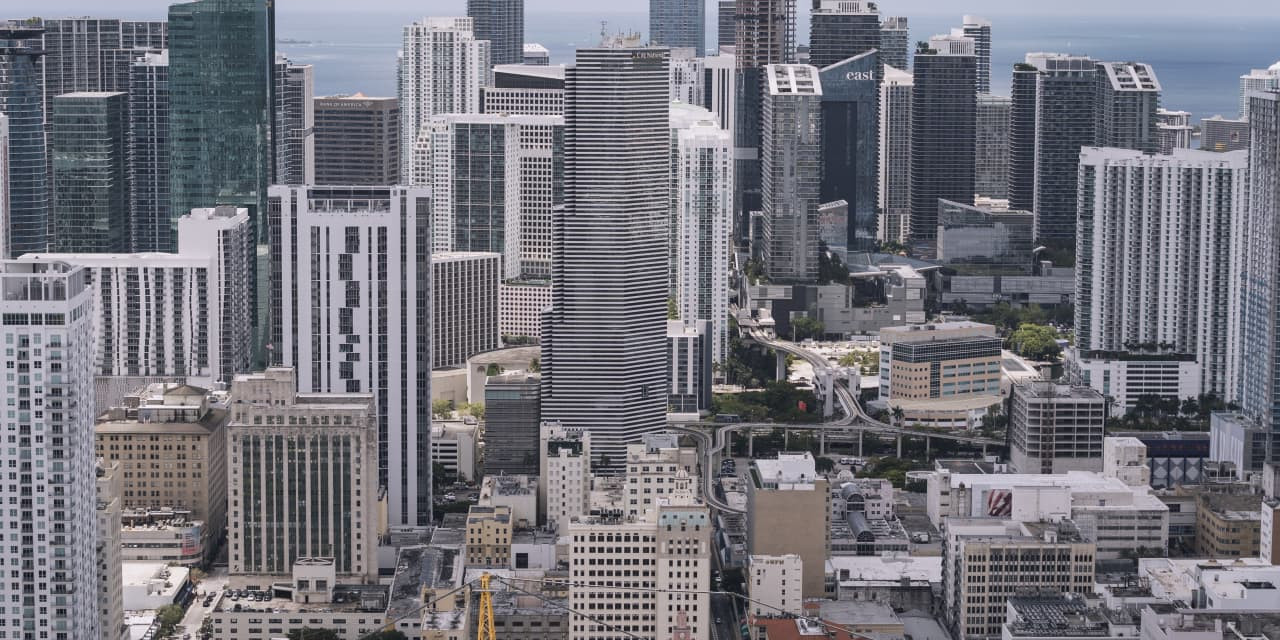For the second year in a row, the risk of housing bubbles in cities across the world has decreased on average, according to a UBS analysis, and home prices in many cities have mostly bottomed out. But that doesn’t mean potential peril has simply evaporated, for one city especially. “Miami now shows the highest bubble risk among the cities in this study,” UBS said.
“High bubble risk can also be seen in Tokyo and, despite a significant decline in the score compared to last year, in Zurich,” the financial services company continued. “An elevated risk of a housing bubble is evident in Los Angeles, Toronto, and Geneva.”
So we know home prices soared during the pandemic; people could work from anywhere and mortgage rates were wildly low, so they bought homes. Home prices are still high and continue to rise nationally, albeit at a slower pace. However, inflation-adjusted housing prices in the cities covered in the study are about 15% lower than in the middle of 2022, when the Federal Reserve and other central banks really started raising interest rates, according to the study. So if you look closer, you’ll see home prices are below their pandemic peaks in places such as Frankfurt, Munich, Stockholm, Hong Kong, and Paris, by 20% or more; in Vancouver, Toronto, and Amsterdam, prices have declined about 10%, per UBS. But “in the sought-after locations of Dubai and Miami, housing prices surged further,” the report read.
But let’s focus on America, which as UBS noted, is suffering from an affordability crisis that’s seen monthly mortgage payments as a percentage of household income far more than what was seen at the peak of the housing bubble in the early 2000s. But price corrections this time around are scant. “New York’s housing prices have not corrected sharply,” UBS said, citing that they’re only down 4% from pre-pandemic levels and have even increased in the last year. Boston has seen home prices leap 20% since 2019, and it has outpaced the city’s rental market and income growth.
Then there’s Miami. “Fueled by a booming luxury market, prices in Miami have risen by almost 50% in real terms since the end of 2019, 7% of which was in the last four quarters,” UBS said. To compare, Los Angeles, despite being an incredibly expensive city, has barely seen its housing prices rise since the middle of last year.
Any rating greater than 1.5 translates to a high bubble risk, according to UBS, and it’s given Miami a 1.79 score, putting it on top. At the end of 2019, Miami’s average home value was about $346,000. Today, it’s about $580,000. The city’s home prices haven’t fallen.
Early last year, I posed the question: “Is the home price correction simply delayed in Miami? Or is Miami set to miss it entirely?” At the time, those in the city’s real estate industry explained that American people looking for cheaper homes, companies looking for a change, and foreign buyers looking to pay for homes in all-cash, flocked to the city during the pandemic, which is why home prices rose so rapidly and substantially. The question was if that’d continue with the pandemic mostly in the rearview. So far, a correction hasn’t happened, but that doesn’t mean it won’t. We’re seeing some tension already with condominiums, which could be a telltale sign or an isolated issue.
The Miami Housing Bubble: A Detailed Analysis
Miami's housing market has skyrocketed, buoyed by a combination of affluent buyers from within the U.S. and abroad, a limited supply of high-end properties, and an evolving perception of real estate value. According to the Global Real Estate Bubble Index 2024 from UBS, The city's real estate market is now regarded as the most precarious, surpassing major financial centers such as Tokyo and Zurich.
Factors Fueling Miami’s Housing Market
Several critical factors are contributing to the exceptional price increases in Miami's housing market:
- High Demand: The influx of affluent buyers from both domestic and international markets has fueled demand, driving up prices. The pandemic's remote work trend further incentivized relocation to Miami, contributing to the surge.
- Limited Supply: Miami’s limited supply of high-end properties and waterfront homes has amplified price increases. As demand outpaces supply, scarcity becomes a major driver of market valuation.
- Favorable Tax Environment: Florida's tax-friendly policies, including the absence of a state income tax, have attracted wealthier residents and investors, further stimulating demand and supporting price growth.
- Lifestyle Appeal: Miami’s unique blend of beaches, vibrant culture, and amenities has made it a desirable destination for both residents and investors. The city's appeal as a “second home” destination and a growing global hub further drive real estate demand.
- Speculation and Investment: As with many booming markets, speculation and investment have played a significant role in Miami’s housing market. Investors seeking quick returns and short-term profits have driven price appreciation, creating a cycle of inflated valuations.
Risks and Challenges in Miami's Housing Market
As we navigate the landscape of Miami's housing market, several risks and challenges emerge that could impact its future:
- Rising Interest Rates: As the Federal Reserve continues to raise interest rates to combat inflation, borrowing costs for mortgages are increasing. This will make it more expensive for buyers to finance homes, potentially dampening demand and leading to a price correction.
- Economic Slowdown: A broader economic slowdown or recession could negatively impact the housing market, as job losses and reduced spending power could limit demand for homes.
- Affordability Crisis: The persistent gap between rising home prices and stagnant incomes creates a significant affordability crisis for many residents, particularly those in lower-income brackets. This situation creates social challenges and could lead to instability in the housing market.
- Climate Change: Miami’s vulnerability to rising sea levels and other climate change-related threats poses a long-term risk to the city's real estate market. The potential for increased insurance premiums and reduced property values could impact future investments and affordability.
- Overvaluation: With prices reaching historically high levels, concerns over overvaluation are growing. If the market experiences a correction, significant price drops could occur, leading to financial losses for homeowners and investors.
- Speculative Bubbles: The presence of speculative buying and investment further contributes to concerns about the sustainability of Miami's housing market. If the market loses momentum, a rapid price decline could occur, potentially impacting the overall financial stability of the city.
Miami's Housing Market: A Balancing Act of Risks and Opportunities
The implications of an overinflated housing market in Miami extend beyond the immediate concerns of current homeowners and sellers; they affect the entire community and potential new buyers. For those considering entering the market, the situation poses both a risk and an opportunity.
Miami’s Housing Market: A Balancing Act of Risks and Opportunities
Many first-time buyers face an uphill battle to secure affordable housing in a marketplace characterized by inflated prices. The challenge becomes extra daunting as they navigate the complexities of financing amid rising costs. Additionally, with increased dialogue around the potential for a housing crash, many may be hesitant to invest in a market viewed as unstable or unsustainable.
The Future of Miami's Housing Market: A Look Ahead
As the Miami housing market stands at a critical junction, housing prices and economic pressures create a precarious environment. The city's top ranking on UBS's Global Real Estate Bubble Index reveals the urgent need for stakeholders to assess short- and long-term strategies while considering emerging trends.
The rising prices fueled by various factors present an extraordinary opportunity for some investors. Still, for the average consumer, navigating this turbulent real estate landscape poses extensive challenges. At this phase, the focus will shift from speculative investments toward securing financial stability and affordability in a market fraught with uncertainty.
Over the coming months, it will be imperative to observe how the dynamics within Miami's housing market evolve. The interplay of supply and demand, economic fluctuations, and environmental concerns will shape the future of this once-thriving market.

















